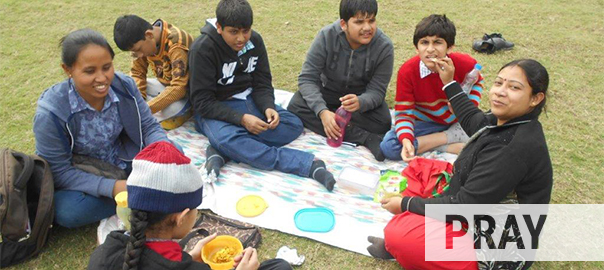As a child, I used to spend many weekends and big chunks of my summer vacations at my grandparents’ house in a tiny village in Central Europe. One of their neighbors had a child like I’d never seen before. He couldn’t walk, he always sat in a stroller even though he was around my age, and his limbs looked kind of twisted. We rarely ever saw this family leave their house and there was always an air of secrecy surrounding them. My cousin and I used to peek through the fence to get a glimpse of the little boy soaking up some sun in the yard, mumbling to himself. The father was an alcoholic, and somehow everyone seemed to know the reason. Once they had a second child, the mother would bring her out to play with the other kids, but the boy was always left behind the fence. I remember feeling sad for him and wishing he could come out to join us.
I don’t remember seeing many special needs people in my environment growing up, and it is similar in India. The same sense of shame and secrecy seems to permeate people with disability here today. Society still has a long way to go to accept differently abled people as valuable human beings. According to many people’s opinions and beliefs, disability could be a curse on the family for something they have done or a result of karma, showing that the individual did something punishable in their previous life. This way of thinking leads people to blame the parents and the child, instead of offering help and support.
The shame and hopelessness parents feel about having a “faulty” child often compels them to keep these special kids hidden. Children may be confined inside the house for most of their life, with no chance to go to school and improve, to interact with others, to learn any skills or to feel productive in any way. Parents do not want to invest in their lives, as their investments won’t bring fruit—these kids will not be able to care for them in their old age.
In a place where general public often shames, makes fun of or simply ignores special children, these families are under a heavy emotional burden. Not only do parents have to fight society’s apathy and condemnation, but also their own depression and even suicidal thoughts at times. They need all the help and encouragement they can get. But often, instead of understanding and seeking ways to support, extended family members and neighbors add to the burden by criticizing and tearing down the desperate parents. Even church communities can be ignorant and insensitive to the needs of families with special kids.
Centers like In His Image can be wonderfully helpful places for differently abled kids to learn and improve and for parents to gain understanding and acquire the skills needed to care for their children. Here they can also find emotional support from teachers and other parents. However, parents who do come to the point of accepting their child’s disability and seek help often do not realize that they are dealing with a lifelong condition that will not be cured. We also need more centers for the differently abled in India and in similar countries around the world that also offer emotional support for the teachers, therapists and staff. The burnout rate is quite high in this stressful and challenging area of work.
In John 9 we read a story of Jesus’s disciples encountering a blind man. Their questions (“Rabbi, who sinned, this man or his parents, that he was born blind?”) reveal similar thinking as described above. In response to their inquiry, Jesus tells them that the man was born blind so that the works of God might be displayed in him. The way Jesus interacts with the blind man dissolved shame and gives the man dignity. All people—and therefore all people with disabilities—were made in God’s likeness for the purpose of displaying His glory.
If we believe this, the way we view and treat differently abled people will be entirely new! Please join us in prayer.
Pray for the differently abled: to be welcomed, loved and well taken care of, not hidden, despised and abused; to attend schools/centers where trained professionals help them improve; to accept and love themselves; to learn skills; to find suitable jobs and be able to earn some money and live as independently as possible; to know Christ and the love He has for them.
Pray for society: for worldviews and beliefs to change regarding disability; for acceptance of differently abled people and not viewing them as a curse or as bad karma; for people to recognize differently abled persons’ gifts and talents and see that they are all special in their own way.
Pray for families: to go from denial to acceptance regarding differently abled children; for extended family members and neighbors to show support instead of burdensome criticism; for siblings of special children to be able to cope with their situation and not feel overshadowed.
Pray for teachers: for compassion, patience and wisdom in taking care of special children; for creative ideas in therapy; and against burnout.
Pray for the church: to be a leader in accepting people with disabilities; and to invest time and attention in figuring out ways of welcoming and supporting families with differently abled members.
Pray for the government: to recognize the need for more initiatives, resources and affordable services for people with disabilities and their families.
••••••••••
Written by Adrienn


Leave A Comment